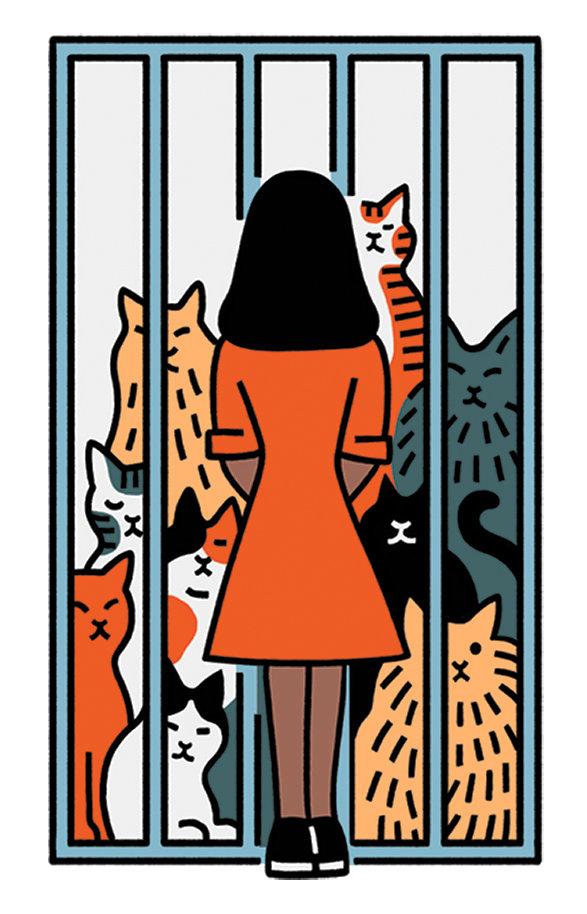
In response to a question about whether to adopt a cat from a No Kill shelter or one that kills, The New York Times’ ethicist—citing PETA, HSUS, and the ASPCA—tells its readers that, “I myself have concluded that it can be O.K. to kill creatures” and that No Kill is a “noble aspiration” at best, but more likely leads to “warehousing.” He then suggest that readers do more research.
It is an oxymoron for someone to claim the title “ethicist” and then embrace decidedly unethical behavior by saying it is ok to kill animals. It is also not very smart. Given that PETA has a history of stealing and killing healthy animals, rounding up young community cats to put them to death (and calling on cities and towns to do the same), of promising people it will find homes for animals only to put them to death within minutes, fighting shelter reforms, believing that all dogs labeled “pit bulls” in “shelters” should be put to death, defending even abusive shelters, and killing or causing to be killed upwards of 99% of all animals, why is an ethicist listening to them?
As to doing more research, physician heal thyself. Had the “ethicist” done some research, he would have discovered that No Kill is more than a “noble aspiration,” it’s a reality. And warehousing? When I ran an open admission No Kill shelter, our average length of stay was only 8 days, no animal ever celebrated an anniversary there, they were fed nutritious food, given excellent veterinary care, plenty of TLC, and while there, dogs were walked four times a day and cats got out of their enclosures at least two times per day. In other words, something cannot be impossible if it has already been achieved.
This is what he should have written:
Adopting from either a kill shelter or a No Kill shelter is good for animals because both can save a life. Adopting from a No Kill shelter can save a life because No Kill shelters not only keep animals out of kill shelters, they often pull animals off death row at kill shelters and find them homes instead.
Adoption from a kill shelter can save a life because it prevents an animal from dying at the hands of shelter employees who have refused to implement existing, life affirming alternatives to killing; alternatives that have already allowed many hundreds of progressive shelters across the nation to abandon a cruel, antiquated and anachronistic manner of “sheltering” (a euphemism if ever there was one) based on the deliberate and immoral taking of life.
After all, killing is an act of violence which denies to an animal both its birthright and that which they, like we humans, cherish above all else: their very lives. It is, therefore, patently unethical. And given that it is unethical to take a life, seizing the opportunity to aid in the prevention of such an outcome is the moral thing to do. Either way, you can’t go wrong.
Where one CAN err when making a choice as to where to acquire a new best friend is to choose to buy, rather than adopt. With animals facing the possibility of death if they have had the grave misfortune of entering a shelter that has yet to embrace life-saving innovation, choosing not to save a life when the opportunity presents itself is morally problematic; especially when buying an animal can also mean supporting an industry based on cruelty, neglect and exploitation of animals: the puppy and kitten mill industries.
That would have been the ethical answer. Yet sadly, what reading prior columns written by the “ethicist” has taught me is that when the subject involves a non-human animal, he cannot be counted upon to deliver a verdict that is in keeping with universal moral principles—the rights to life, liberty, and the pursuit of happiness—or even scientific acknowledgment: that ‘we share biological histories and physiologies—DNA, eyes, muscles, nerves, neurons, hormones—with other animals and these lead to similar behaviors, thought processes, and emotions—even about death.’ Instead, he regurgitates the pervasive, and decidedly inadequate, attitudes toward non-human animals common to the era in which he lives.
The fact that PETA, HSUS and the ASPCA have long championed not only complacency with the needless atrocity of shelter killing, but in some cases, have aggressively promoted and even practiced it, says nothing about the righteousness or morality of that position. Rather, it is evidence of the corruption at those organizations which the No Kill movement itself was founded to combat.
Making public pronouncement about the No Kill “debate” by regurgitating antiquated and thoroughly disproven dogma perpetuated by those who are threatened by the paradigm shift that the No Kill movement represents is not to provide a deep or thought-provoking ethical insight. It is to perpetuate the most facile of falsehoods readily obvious to anyone capable of a simple Google search.
Badly done.
————-
Have a comment? Join the discussion by clicking here.